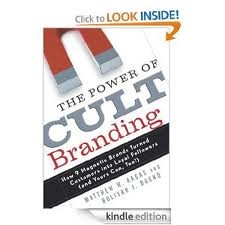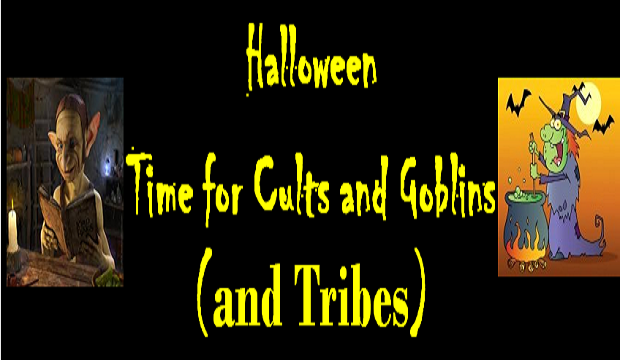Halloween: Time for Cults and Goblins (and Tribes)
It’s Halloween, time for some fun with cults and goblins and the like. Some cults and goblins are good. For years now the press has categorized Dimensional Fund Advisors (DFA) as a cult (see NY Times). If it is, the DFA cult is allegedly a good cult, just like the bankers goblins of Harry Potter. Ever wonder why the press calls DFA a cult? Let’s look.
Here are the characteristics of cults and how DFA qualifies. Just for fun, and to bring home the distinction between a cult and a non-cult, I compare myself to DFA (big stretch, right?). Don’t laugh -- I qualify as a cult on one criterion but fall far short on another.
The Characteristics of Non-Religious Cults
Anti-establishment – Cults are “little groups” that break off from the conventional consensus and espouse very different views of the real, the possible, and the moral. (John Lofland, Sociologist)
- DFA was once small. Now it has thousands of adherents to the “passive-wins-index-investing-is-best” doctrine. Followers proclaim broad diversification by chanting “we invest in 12,000 securities.” They also sing DFA fight songs.
- My work and views meet this anti-establishment criterion. In contrast to DFA, I reject the view that “passive wins,” at least not all the time. I am contra-DFA and anti-establishment. I challenge the status quo in manager due diligence and target date funds. Do you scorn peer groups? Are you tired of selecting lousy managers? Can UMAs and UMHs be improved? Would you like safer target date funds? These are the passions of the Surz tribe. Although I meet the anti-establishment criterion for a cult, I do not meet the next criterion.
Captive – A cult is an ideological organization held together by charismatic relationships and demanding total commitment. (Benjamin Zablocki, Sociologist)
- DFA has ties to the University of Chicago and some of its most illustrious and charismatic academics, like Professors Eugene Fama and Kenneth French. The business school is named the Booth School in recognition of David Booth, founder of DFA, who contributed more than $300 million to the university. DFA disciples are indoctrinated via long training programs, scrutinized by guardian wholesalers, and ostracized for the sin of choosing non-DFA managers.
- I do not meet this criterion. Far from it. I’m likable, but regrettably not charismatic, and I don’t require exclusive use of my services, some of which are complementary to other services. As for dedication, it’s easy to love PODs and StyleScan, so total commitment comes naturally. But few know these innovations exist. So you see, I am in serious need of mystically marvelous sales goblins because marketing – even DFA's non-marketing marketing -- is everything.
Do you think DFA is a cult?
There’s certainly nothing wrong with that, and DFA does meet the definitions above. Regardless of what DFA is, you’ve got to admire and respect their success.
If you’ve read this far, you know who DFA is but you probably are asking “Who is Ron Surz?” Or as my wife says “What exactly do you do?” For my wife and everyone else, I like to think of myself as a visionary with aspirations to transform decades-old flawed practices into something much better—tools that actually work to differentiate between good and bad, between success and failure. Clients deserve it, especially those who rely on us for active manager selection and portfolio construction. I’ve started a movement, a tribe of like-minded people. You’re welcome to join. To paraphrase David Loeper, CEO of Financeware, I make the world’s best hammers but none of them swing themselves – they need skilled craftsmen in order to do their job. They need you, and you need them.
“What exactly do you do?” For my wife and everyone else, I like to think of myself as a visionary with aspirations to transform decades-old flawed practices into something much better—tools that actually work to differentiate between good and bad, between success and failure. Clients deserve it, especially those who rely on us for active manager selection and portfolio construction. I’ve started a movement, a tribe of like-minded people. You’re welcome to join. To paraphrase David Loeper, CEO of Financeware, I make the world’s best hammers but none of them swing themselves – they need skilled craftsmen in order to do their job. They need you, and you need them.
Happy Halloween. Hope you’ve enjoyed the fun.
To learn more about Ron Surz, visit PPCA, Inc.

